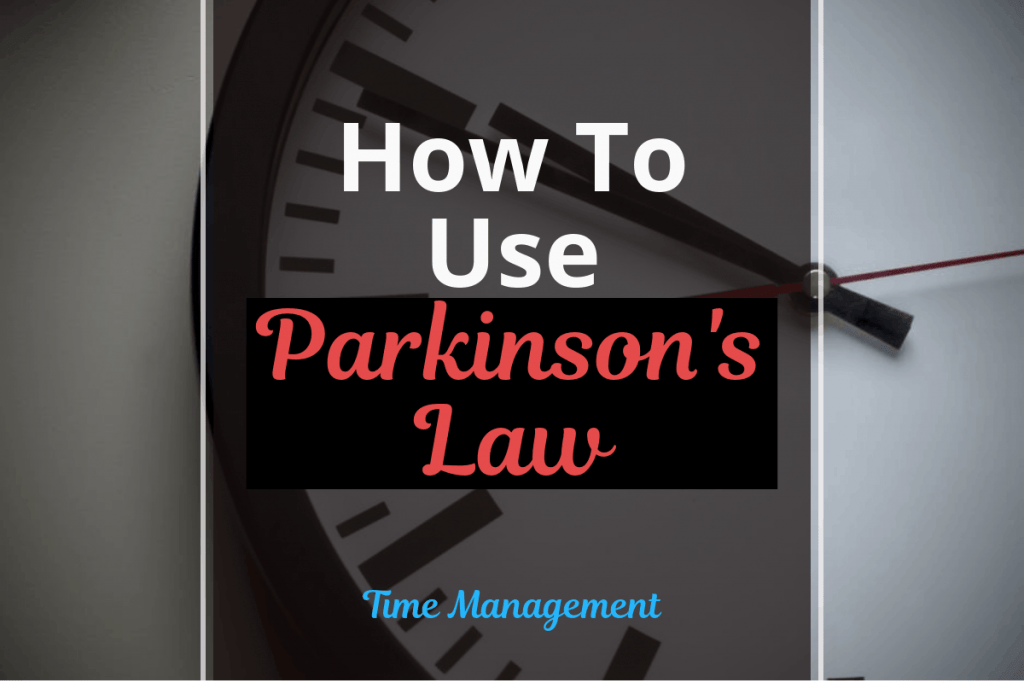🖊 This article was last updated on May 9, 2020
Do you tend to postpone tasks until the last minute? Do you have a hard time meeting deadlines? If your to-do list never seems to get any shorter, consider making some changes to your routine. A good start would be to set new limits, constraints, and deadlines into your life. It might seem counterintuitive, but sometimes, that’s all it takes to get things done.
In fact, there’s a whole philosophy behind it. According to Parkinson’s Law, work expands to fill the time allotted for its completion. This concept applies to all areas of life, not just to business or career. Let’s see what it really means and how to use it to your advantage!
Understanding Parkinson’s Law
Imagine you have an entire month to write a whitepaper, and yet, you only start writing it in the last two days before the deadline. Or that you had three months to get in shape for a sports competition, but you only get really started two weeks before the event.

Let’s take another example. Your new website needs to be ready no later than a month from now on. Yet, you’re procrastinating all the time and you tell yourself that there’s still plenty of time to set up your site. And then, 28 days have passed and you still don’t have a website so you scramble to get it finished. And it (barely) works.
That’s pretty much how the Parkinson’s Law works. This concept was developed by British historian and writer Cyril Northcote Parkinson. He first mentioned it in one of his articles for The Economist in 1955. Later, Parkinson wrote an entire book defining this philosophy and its applications in business and everyday life.
Most entrepreneurs nowadays are familiar with this law due to the Four-Hour Work Week, Tim Ferriss’s wildly popular bestseller. Parkinson’s Law is cited in thousands of other books, magazine articles, and blog posts. Even though today it has a different meaning and purpose than it had back in the ’50s, its importance should not be underestimated.
How Parkinson’s Law Changed Over Time
The concept was initially used to describe the driving factors behind bureaucracy. According to Parkinson, work is elastic and has nothing to do with how much time you have on your hands or the number of people working on a task. He also states that growth is not related to work by any means.
Basically, according to this “law”, it doesn’t matter how big your project is. You can probably complete it in as little as a few days or as long as one month depending on how much time you’ve been given (or have given yourself).
So how can you use this concept to boost your motivation and productivity? The key is to set deadlines for any task, no matter how small. You’ll be amazed at what you can get done by eliminating dead times and focusing on the task at hand.

Get More Done in Less Time
Now that you know how Parkinson’s Law works, you can use it to your advantage. The whole idea is to apply new deadlines to your work so you can motivate yourself to take action and stop procrastinating.
In other words, it’s important that you focus on time instead of tasks. This concept is known as timeboxing or time blocking. It involves setting a time period to work on your tasks, regardless of their complexity. Tesla CEO Elon Musk, for instance, uses this strategy to get more done in less time. He’s famous for his ability to juggle multiple projects and accomplish his goals despite having a hectic schedule.
Ready to change your approach to work and become more efficient in everything you do? Here are some tips to help you out!
Set Your Own Deadlines
When you run a client-based business, you must complete each project before the specific deadlines you agree on. However, if don’t do client work, or if you want to be more productive, set your own deadlines in addition to those set by your clients.
Write down your tasks and divide them up by how much time it takes to complete them. Cut the time allocated to each by half. For example, if you have one month to write 10 blog posts, give yourself two weeks to finish everything. Stick to the deadline no matter what.
Experiment with different time frames. Be realistic about what you can accomplish before the deadline, but don’t give yourself too much room to procrastinate. Writing 10 blog posts in two weeks is not difficult at all, but crafting 50 blog posts in the same time frame would simply be unrealistic.
Make Deadlines for Everything
Undefined deadlines, deadlines too far away, and projects too large fuel procrastination. Without a specific timeframe in mind, it’s easy to postpone things and ignore your priorities. Use a calendar to schedule your tasks. Push all deadlines up by two or more days.
Use the Pomodoro Technique
Setting (artificial) deadlines for yourself can help you tremendously, but it can also stress you out. That’s why I recommend you implement this together with the Pomodoro Technique. This makes sure that along with working in short 25-minute sprints, you also take the time to relax.

With this approach, you’ll manage your time more effectively and eliminate distractions. It’s also a great way to stay motivated, keep yourself accountable, and prevent mental fatigue.
Try this technique for a week, and you’ll see immediate results.
Create Incentives to Meet Your Goals
One reason why so many entrepreneurs procrastinate is that they often don’t have the motivation to get things done because there’s no immediate reward/benefit. For instance, you finish a client project on time, send it to your client, and he gives you more work with an even tighter deadline. Sure, this shows that you’re doing a great work, but it’s easy to lose your motivation in the long run.
So why not reward yourself for finishing work early? Go out for a walk, plan a shopping session, or order your favorite food. If you manage to complete a big project before the deadline, book a trip over the weekend and relax.

The whole point is to associate incentives with results, not with time spent. Sometimes, you need more than money to stay motivated. Setting your own reward system might do the trick.
Remember, the key is to work smarter, not harder. Use Parkinson’s Law to free up your time and grow your business. Soon, your productivity will reach new heights.
- These Black Friday deals will skyrocket your productivity (2021 edition) - November 11, 2021
- How to Stay Productive as a Digital Nomad - December 23, 2019
- When is the right time to outsource? - December 3, 2019

